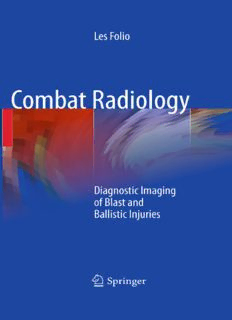
Combat Radiology: Diagnostic Imaging of Blast and Ballistic Injuries PDF
Preview Combat Radiology: Diagnostic Imaging of Blast and Ballistic Injuries
Combat Radiology Les R. Folio Combat Radiology Diagnostic Imaging of Blast and Ballistic Injuries LesR.Folio,DO,MPH,FAOCR Col(ret),USAF,MC,SFS AssociateProfessor RadiologyandRadiologicalSciences AssociateProfessor MilitaryandEmergencyMedicine UniformedServices UniversityoftheHealthSciences Bethesda,MD USA ISBN9781441958532 eISBN9781441958549 DOI10.1007/9781441958549 SpringerNewYorkHeidelbergDordrechtLondon LibraryofCongressControlNumber:2010931687 #SpringerScienceþBusinessMedia,LLC2010 Allrightsreserved.Thisworkmaynotbetranslatedorcopiedinwholeorinpartwithoutthewritten permissionofthepublisher(SpringerScience+BusinessMedia,LLC,233SpringStreet,NewYork,NY 10013, USA), except for brief excerpts in connection with reviews or scholarly analysis. Use in connection with any form of information storage and retrieval, electronic adaptation, computer software,orbysimilarordissimilarmethodologynowknownorhereafterdevelopedisforbidden. Theuseinthispublicationoftradenames,trademarks,servicemarks,andsimilarterms,eveniftheyare notidentifiedassuch,isnottobetakenasanexpressionofopinionastowhetherornottheyaresubject toproprietaryrights. Printedonacidfreepaper SpringerispartofSpringerScience+BusinessMedia(www.springer.com) To my wife, Jutta Frankfurter, and my son, Lucas Skye Folio. Foreword IwascertainlypleasedwhenDr.LesFolioinvitedmetowritetheforewordtohis newtextbook.Wehavebeenfriendsformanyyearsandsharedourunderstanding of biomechanics and imaging of high-energy trauma as well as our diagnostic approaches. We share a similar level of enthusiasm to maximize the diagnostic potentialofimaginginseveretraumaandtooptimizeconditionstofacilitatefaster andmoreaccuratediagnoses,whentimeisthemostcriticalcommodityofcare.We discoveredmanyoverlapsinourpracticemethods,butnotsurprising,manyunique aspectstoeach. Dr. Folio is a diplomat of the American Osteopathic Board of Radiology and American Osteopathic Board of Occupational and Preventive Medicine attaining Fellowshipinbothareas.Hehasearnedmaster’sdegreesinPublicHealth,Clinical Radiology, andAviationSciences.HehasservedasanAirForceRadiologistand Flight Surgeonandrecently completed20yearsintheAir Force; hisfinalassign- mentwasatWalterReedArmyMedicalCenterandUniformedServicesUniversity (USU). He is an Associate Professor of Radiology and Radiological Sciences and Associate Professor of Military and Emergency Medicine at USU. He has com- pletedtoursofdutyinIraqandhascontributedhisknowledgeinforensicradiology at Dover Air Force Base in Dover, Delaware, studying warfare. If these many significantaccomplishmentswerenotenough,hehasalsoearnedablackbeltfrom World Taekwondo Federation while stationed in Korea and is a certified Master ScubaDiverandalifetimememberofNationalSkiPatrol.Relatinghisothermajor accomplishmentswouldrequireanotherchapterinthebook. Clearly,Dr.Foliobringshisdiversetrainingandaninquisitive,creativemindto improvingdiagnosticimagingoftheseverely injuredbattlefieldcasualty.Heuses hissubstantialknowledgeofimaging,anatomy,andbiomechanicstooptimizethe treatmentofthesepatientsandtoconstantlylearnmoretobetterunderstandhigh- energyforceinjuryandpossiblemethodstoamelioratetheirimpact.Inthisprocess, hefindsnewquestionsthatrequirefurtherinvestigation.NooneinAmericatoday hasbeenbettertrainedandexperiencedtowritethistext. vii viii Foreword Thereaderofthistexthasaringsideseattotheuniqueimagingtheaterfashioned fromthespecialmedicaldemandsofwar.Dr.Foliosharesmanyconceptsthatcan beusedintheirentiretyoradaptedtotheworldofciviliantrauma.Radiologistsand other physicians, technologists, nurses, and ancillary medical support personnel caringforpatientswithpenetratingandseverebluntforceinjuryintheirpractices willbenefitfromreadingthistext. Of course, the focus of this book is the imaging presentation of a variety of ballisticandblastinjuriestypicalofbattlefieldwounding.Animprovedunderstand- ingofthemedicaleffectsandanatomicpathologycreatedbyballisticmissilesinall bodyregions is provided. Theimportanceandmethodology ofestablishing injury tractsthroughthebodyindecidingmanagementareemphasized. Thereareseveralchaptersthatdiscussissuesmoregenerallyapplicabletomajor traumaonthehomefront.ManyissuesrelevanttoEmergency-TraumaImagingare considered in this book. What “shortcuts” can be used to adequately image the majorbluntforceandpenetratingtraumapatientwithoutsacrificingtheaccuracyof diagnosis? How are imaging protocols tailored to allow fast interpretation and transferofvitalinformation?HowdowebestintegrateRadiologyintothetrauma team to assist in optimal triage and subsequent patient care? What are the major indications for advanced imaging applications such as volume rendering and CT angiography in a mass casualty setting? How best are technologists trained and supervisedtoperformrapidstudiesofoptimalimagequality?Howarestandardized reporting formats used to consistently provide reports containing all necessary information? What types of standard equipment modifications might be of value tomorerapidlyandefficientlyimagethesepatients? Besides discussing the various technical issues in obtaining and interpreting battlefieldimages,Dr.Folio,whohasawealthofmilitarymedicalexperience,tells the reader a story of what it is like to serve as a military radiologist in this very demandingandstressfulenvironment,butwhilealsoservingwithamedicalteamat the height of collaboration and uniformity of purpose. I think you will enjoy and learnfromhisinsights.Theradiologistreadermayacquireawholenewperspective on what a demanding workload really means. I expect that some of the ideas presentedhereinwillfindtheirwayintomanyofthereaders’practices.Enjoy! StuartE.Mirvis,MD ProfessorofRadiology UniversityofMarylandSchoolofMedicine Preface When I was invited by Springer to write this book on my experiences as a radiologist in Iraq, I immediately agreed (after consulting with my wife Jutta, of course) as it seemed the perfect “summer project” to fill the gap between retirementfromtheAirForceandstartingmynewcareerattheNationalInstitutes ofHealth(NIH).Thepublisherfoundmanyofmypublicationsoncombatimaging, and since I had chaired several national and international conferences on trauma imaging, Iwas ready to putthis book together in a short period of time. Our goal wastogettheinformationouttherefordeployingradiologiststouseandpreparefor combatradiology.Atthesametime,Iwantedtokeepthebookgeneralenoughtobe a reference for any hospital with an emergency department or trauma unit since explosions, disasters, and mass casualties can happen at any time. Since ballistic injuriesareoftentheunintendedconsequencesanywheremanandgunscollide,this book should be generalizable to most radiologists, emergency department physi- cians,traumaunitnurses/medics,andtraumasurgeonsworldwide. OnceIstartedwriting,thisbookevolved differentlythanwhatIhadoriginally envisioned.Afterdiscussionswithmanyofmycolleaguesandfriends,however,it seemedtheresultingformatisbetterthanasystems-basedapproachthatIhadfirst planned.ThosereadingmyinitialdraftssuggestedthatIcapturetheessenceofthe environmentfromthebeginninganddonotuseahead-to-toeapproach. Tosetthestage,Iincludedabackgroundonwhatitislikeforaradiologisttobe inthemilitaryandhavetodeployintoharm’swayatamoment’snotice,whatitis like to carry a weapon at all times, and what it is like to wear body armor and a helmetwhileconsultingtraumasurgeonsonimages,allwhilebeingattacked. Followingadescriptionofcombatscenes,tothelayoutofourcombathospital, Ithendecidedtodescribebasicblastandballisticpropertiesbothoutsideandinside thebody.Forexample,IfeltthatshowingphotosIhadtakenduringmedicaleffects ofblastinfieldtestsinSouthAfricawouldshowhowextensiveblastdamagecan be,evenwhenmadewithbasicmaterials.Afterdiscussingthetypesofexplosives and the types of blast injuries, I then show some example images of patients exposedtodifferenttypesofblast. ix
Description: